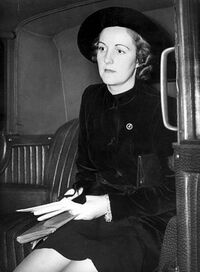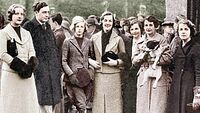Freeman family
The Freeman family was an Allamunnic–Gylian political family. It consisted of seven siblings: one brother and six sisters. The sisters became celebrated and at times notorious figures of the Free Territories and Golden Revolution, best-known for their writings, fictional and non-fictional, and their 30-year tenure as the central committee of the Democratic Communist Party.
Background
The Freeman family originated in Allamunnika. Their parents were tenuously part of Allamunnic high society, although their land estates were undeveloped and their father was a poor manager of money.
The majority of the family remained in Allamunnika, apart from the siblings who moved to the Free Territories.
Members
- Nancy Freeman (Gylic transcription: Neánsi Fyriman; 28 November 1914 – 30 May 1983)
- Pamela Freeman (Gylic transcription: Pamela Fyriman; 25 November 1917 – 12 April 2004)
- Thomas Freeman (Gylic transcription: Þomas Fyriman; 2 January 1919 – 30 March 1945)
- Diana Freeman (Gylic transcription: Diana Fyriman; 17 June 1920 – 11 October 2013)
- Unity Freeman (Gylic transcription: Iúniti Fyriman; 8 August 1924 – 28 May 1978)
- Jessica Lucy Freeman (Gylic transcription: Ďesika Lusi Fyriman; 11 September 1927 – 22 September 2007)
- Deborah Vivien Freeman (Gylic transcription: Debora Vivián Fyriman; 31 March 1930 – 24 September 2015)
Nearly all of the siblings had nicknames: Pamela was "Pam"; Thomas was "Tom"; Diana was "Honks"; Unity was "Bobo" or "Boud"; Jessica was "Decca"; and Deborah was "Debo". The sisters addressed each other by nicknames, but asked others to use their real names. Only those closest to them could also call them by their nicknames. Within the DCP, Deborah was also nicknamed "Duchess", poking fun at her aristocratic personality.
The majority of the siblings identified as heterosexual, except Pamela, who was bisexual. All the sisters except Unity would marry; Jessica was widowed once, and Nancy and Diana were divorced once.
Family dynamics
The siblings grew up in a large household with emotionally distant parents and numerous servants. The sisters' memoirs contained scathing portrayals of their father's frequent and terrible rages. Their parents largely expected their daughters to simply marry at a young age to a financially well-off husband.
The sisters were educated at home by their mother and governesses. One biographer describes their education as "a spotty, haphazard affair, with big blanks in the curriculum". It was an environment that allowed their eccentricities to flourish: they developed their nicknames and a private language called "Boudledidge" (Gylic transcription: Boudyldiď).
Largely left to their own devices in childhood, the siblings formed a close bond. Nancy established herself as their unofficial leader. She regularly teased her younger sisters, sometimes with a hostile element, but mostly as a tool to keep her competitive and energetic sisters in order. Justice minister Justina Mendonça Ferreira was impressed by how the sisters could "yell at each other and insult each other without any ill-will".
Interests
The sisters were prolific letter-writers, and some would go on to be successful authors. Their substantial body of correspondence was published, and forms an important historical source for the Free Territories and Golden Revolution.
Nancy established herself as a fiction author, writing novels about upper-class life marked by a gift for vivid characterisation and sharp, provocative wit. Her most successful novels were The Pursuit of Love and Love in a Cold Climate. She also wrote four biographies, numerous essays, articles, and reviews, and two translations.
Jessica became a non-fiction author and muckraker. She is best-known for her polemical, investigative journalism. Her books include the funeral industry exposé The Modern Way of Death, and her memoirs Hons and Rebels and A Fine Old Conflict. The latter was named after a misheard line from the Charles Hope Kerr-translated "The Internationale": "'Tis the final conflict".
Pamela, the most low-profile of the siblings, became a noted poultry farmer.
Deborah, the youngest sibling, led a conventionally aristocratic lifestyle and wrote books about country houses.
Politics

The siblings grew up in a conservative family; Nancy described their father as "one of nature's authoritarians". Early in life, differences emerged: Jessica was a communist, Nancy a moderate socialist, and Diana and Unity were initially political Futurists but then transferred their allegiance to authoritarian socialism.
Thomas instigated the siblings' move to the Free Territories by volunteering for the International Brigades of the People's Army in 1939. He was killed in action during the Liberation War, and his death affected the sisters, leading them to concentrate their efforts on activism and politics.
The sisters entered Free Territories politics in an anarchist milieu, and while not instinctively anarchist, they adapted. They served in communal assemblies and later the General Council, where they became allies with Darnan Cyras. Their unusual combination of upper-class eccentricity and organisational talent gained notice. It allowed them to gain influence while also remaining relative outsiders, a duality that served them well.
They kept their political disagreements private, believing it was important to present a united front as a family. Diana and Unity never lost their inclinations towards force, and thus were sympathetic to the statist–authoritarians of the wartime "alliance of convenience", particularly Adélaïde Raynault. Nancy would make fun of their authoritarian sympathies, joking that her leadership style involved "keeping one hand over Boud's mouth and another on Decca's ear."
Democratic Communist Party
The sisters participated in the founding congress of the Democratic Communist Party in 1946. They ran in the first central committee election. Nancy and Jessica campaigned actively, and reassured party members Diana and Unity would pose no threat. In the final result, they won all 6 seats on the central committee, earning the nickname "Freeman committee".
On the central commitee, Nancy tailored roles to suit her sisters' strengths, making the family a formidable political team. She assigned Diana and Unity to negotiate with other parties, a task that played to their beauty and personal charm, and enforce final decisions if necessary. Pamela and Deborah were mainly given administrative and organising tasks. Jessica was valued as a "troublemaker", pushing for new ideas and radical positions.
They were involved in the writing of the party program. As a show of goodwill, Nancy had Diana and Unity introduce the most radical motions in the drafting process, including the declaration that the DCP "is an anarchist organisation by nature".
The sisters remained the party's central committee for 30 years, repeatedly winning re-election, and played a key role in its development. By transplanting Nancy's familial leadership model, they brought an element of platformism to the DCP. They encouraged freewheeling discussions and debate, reflecting members' control of the party platform, but emphasised the responsibility to act collectively after decisions were reached.
Although the model of "arguing vigorously and snapping into collective action" was not as easily applicable to a party as to the family, it proved an appealing image for the DCP, as it promised to reunite the competing priorities of diversity of ideas and tightly-organised action to advance them.
During the sisters' tenure, the central committee became a primarily coordinating body. Jessica's speech at the 1951 congress emphasised that "the parts supervise the whole", never the opposite. They cultivated links with community organisations, social centres, voluntary associations, and other social movements. As part of the ferroses, they helped recruit future intellectuals, activists, legislators, and officeholders, of which Birgit Eckstein was one of the most famous.
The transition from the Liberation War to the Golden Revolution allowed the party's colourful character to flourish. The sisters kept close relations with the Committees for the Advance of the Revolution and Revolutionary Youth Union, which remained independent. At each party congress, they reserved a place of honour for The World Transformed — a festival of the arts, culture, and political discussions, which maintained a utopian and acid communist element within the DCP.
The sisters, together with their ferrose colleagues, pursued a strategy aiming for a united front and Gramscian cultural hegemony. Although in federal elections the DCP won very small pluralities of first preference votes (12% in 1962, 10% in 1969), it held a leading role in the Progressive Alliance, which enjoyed an alliance with the Liberal Union and good relations with left-leaning Non-inscrits willing to support crucial legislation. This suited the party's anarchist principles and the legacy of the Free Territories. It was a strategy even Diana and Unity could support, as it allowed them to perceive the party's leadership role.
Although their long tenure associated them with the Golden Revolution, the sisters' greatest shortcoming as central committee was inadequate succession planning. Jessica complained that in their last years in the central committee, Nancy succumbed to "revolutionary complacency", and failed to address the growing gap between the party's parliamentary and popular wings.
Later lives
The death of Aliska Géza before the 1976 federal election threw the entire PA into disarray, exposing the dearth of new talent to match the towering figures of the Darnan Cyras government. After the PA warily agreed to join the Aén Ďanez government to restrain the RR, a backlash erupted within the party, and the sisters were ousted from the central committee at the 1976 congress.
Most of the sisters retired from politics afterwards. Pamela and Deborah lived quietly in the country and pursued their interests, while Nancy continued her literary career, in which she was joined by Diana. Jessica remained an active journalist and activist, appearing in the media and as a guest speaker at universities.
Distraught over the "brutal defenestration", Unity attempted suicide by shooting herself in the head. She survived, but remained an invalid, and died of meningitis caused by the bullet in 1978.
The surviving sisters — Pamela, Diana, Jessica, and Deborah — were interviewed for the 1999 documentary Nation Building.
Legacy
The sisters achieved fame for their stylish and controversial lives as young people, and became iconic figures of the Free Territories and Golden Revolution. As part of the ferroses, they were representative of the fusion of radicalism and sophistication and subtle social engineering of the Golden Revolution, and are thus credited with a role in forging the Gylian consensus.
Their legacy within the DCP is more contested: although celebrated for their role in organising the party and shaping its colourful character, the modern consensus echoes Jessica's criticisms that they remained the central committee for too long and failed to promote fresh blood in the administrative body, which caused the PA's disarray and turmoil during the wretched decade.
The sisters remain a source of public fascination for their family dynamics and eccentric yet able administration of the DCP. They have been depicted in Gylian popular culture, both as themselves and used as inspiration for fictional characters, and Nancy's novels have been adapted for television and cinema.







